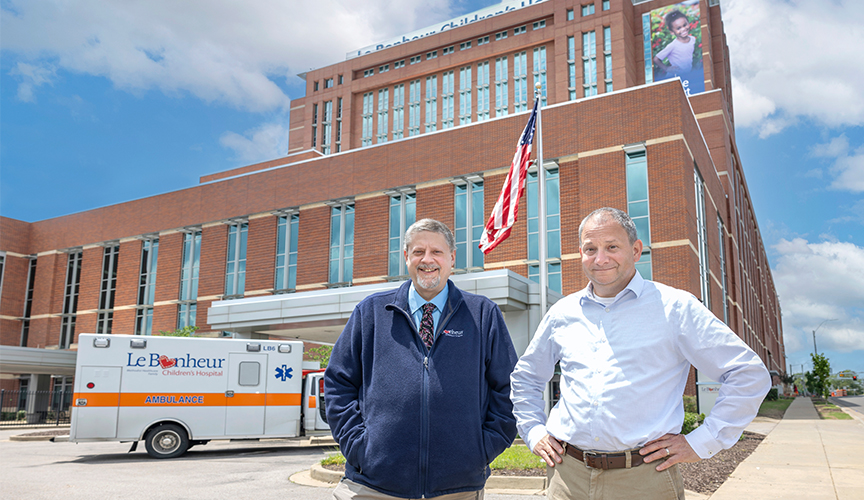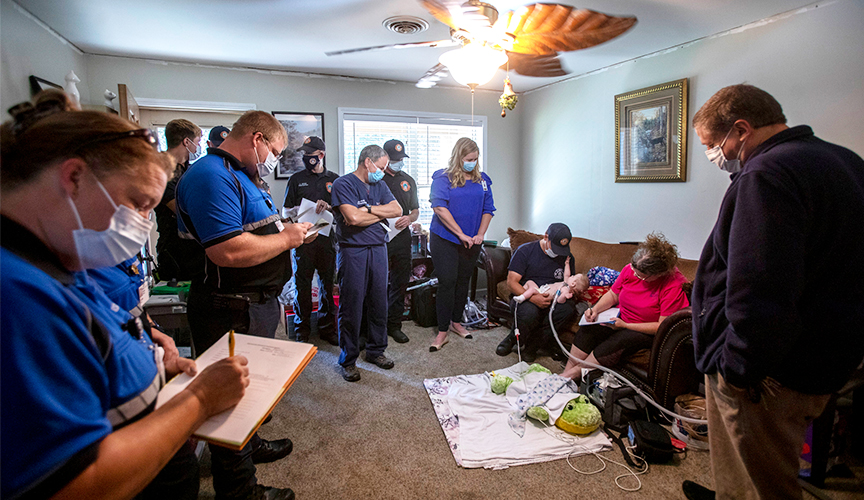A Halo of Care
In an emergency, familiarity and time can be the difference between a positive outcome or a devastating one for a child with special medical needs.
But smaller ambulance services in the rural areas around Memphis don’t receive many pediatric calls, and even fewer pediatric calls are for kids who are technology dependent or high acuity. Le Bonheur Emergency Medicine Specialist Rudy Kink, MD, and EMS Outreach Coordinator John Wright saw an opportunity that Le Bonheur could fill to assist and educate emergency medical services (EMS).
Wright, who has a unique background as both as a nurse in Le Bonheur’s Intermediate Care Unit and a former paramedic, knew what both parties needed to come together for the sake of better care for kids — familiarity, rapport and education. In 2018, he and Kink launched a program that brought rural EMS providers into the homes of Le Bonheur patients with complex medical needs in order to educate and familiarize EMS providers with these patients and their families.
“When these kids get sick, they can get sick really quickly and the earlier interventions can be done, the better for the patient,” said Kink. “Replacing a tracheostomy tube, providing oxygenation or starting other interventions can be lifesaving for a patient, which means they get to Le Bonheur a little more stable. It really makes a difference.”

In 2018, Le Bonheur Emergency Medicine Specialist Rudy Kink, MD, above right, and EMS Outreach Coordinator John Wright, above left, launched a program to connect technology-dependent children with their rural EMS services. Since then, 33 children have been followed in the program.
Just one of the first responders in this program is neighboring Fayette County Fire Department Chief Richard Hartfield who recently went on his first visit to meet a family who had a child with special medical needs in his rural area.
“For us the value is huge. It gives us kind of a leg up on response to know what we’re going to and what we need to do when we get there,” says Hartfield, whose team works in tandem with Fayette County EMS. “Before these meetings, we were going blindly.”
While inpatient at Le Bonheur, patients are identified for the program by social workers, and parents or caregivers are invited to participate on a voluntary basis. If the caregivers accept, Wright reaches out to the rural EMS and fire departments that would respond to the emergency calls for these patients and schedules an introduction between EMS and the child in the home.
During the home visit, EMS teams are able to see the child outside of a crisis situation, ask questions about their medical needs, familiarize themselves with the home and better understand the child’s diagnosis and history. Wright provides information specific to each child when appropriate such as tracheostomy tube sizes, suction instructions, drug doses and ventilator settings. Copies of the child’s information are kept in the ambulance or the 911 office, and EMS services have Wright’s personal contact information.
“Our visits enable us to teach EMS providers about specific equipment needs for a child so that they know the next step in caring for the child in an emergency situation and have a plan of what to do,” said Wright.
“I go and listen to the family, learn about the technology and brief my responders on the needs,” adds Hartfield. “We log the address and now know what the problems are and what the solutions need to be.”
These visits are also important to establish needs in non-medical emergencies such as a house fire or power outage when a child may have specific concerns, such as a generator for a ventilator. In addition to home visits with EMS, Wright also works with the local hospital to ensure that they have the supplies needed to care for the child and a plan to stabilize the child if they need to be transported to Le Bonheur for further care.

Thanks to this program, rural EMS providers can visit children with special medical needs in their area to meet the family, learn about the child’s health needs and familiarize themselves with the home.
This recently came into play for Hartfield when one of the families in the program lost power and was at risk of the child’s medical technology running out of battery. Thanks to a previous visit, the family contacted Hartfield directly who put together a plan to get the family a generator. Fortunately, power was restored, but Hartfield and his team were prepared to respond in case of a long-term power outage that could drastically impact this child’s care.
Since the start of the program in 2018, Wright, Kink and the EMS Outreach team have tracked a total of 33 children who live in rural areas as far as 180 miles from the hospital. Children graduate from the program when they turn 18, move out of Le Bonheur’s catchment area or no longer have acute health care needs.
“We’re in a unique position to train these EMS workers and familiarize them with complex diagnoses and rare diseases that they don’t get exposed to in paramedic and emergency medical technician school,” said Wright. “This is one way that we can be preemptive, proactive and step up case management of our technology-dependent patients to the next level.”
Kink and Wright both hope that they can work with physicians at Le Bonheur to expand the program beyond primarily technology-dependent children to epilepsy and neurological conditions and rare medical disorders. And as Le Bonheur transitions to Epic, a new electronic health record software, a child’s plan for EMS can be automatically updated as they go to appointments and their health or care needs change. This would ensure that EMS and parents always have the most up-to-date information on a child.
Feedback from parents and EMS staff has been overwhelmingly positive, say both Kink and Wright, based on surveys conducted at the end of the visit with both parties. They say that EMS appreciates the practical nature of the assistance, and families feel more at ease knowing a plan is in place for their child in case of emergency.
“I want to see this continue and grow. I know for a fact that we have other kids with special needs,” says Hartfield. “I wouldn’t mind us visiting a home everyday to get this going for every child in the county with special medical needs — that’s what it means to me to have this program.”
Help us provide the best care for kids.
Le Bonheur Children's Hospital depends on the generosity of friends like you to help us serve 250,000 children each year, regardless of their family’s ability to pay. Every gift helps us improve the lives of children.
Donate Now
















